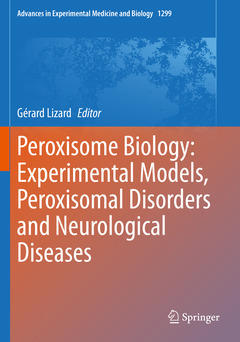Peroxisome Biology: Experimental Models, Peroxisomal Disorders and Neurological Diseases, 1st ed. 2020 Advances in Experimental Medicine and Biology Series, Vol. 1299
Coordonnateur : Lizard Gérard

This book provides an overview of the biology and biochemistry of peroxisomes, and discusses the contribution of these organelles to peroxisomal and neurodegenerative diseases.
It begins with a detailed introduction to the biogenesis and metabolic functions of peroxisomes, and highlights their role in oxidative stress and in lipid metabolism such as fatty acid oxidation. The following chapters focus on the molecular and clinical aspects of peroxisomal disorders caused by defects in peroxisomal function. In particular, the biological aspects of peroxisomal biogenesis disorders such as Zellweger syndrome and Heimler syndrome are discussed. This includes their underlying genetic causes as well as the biochemical and metabolic defects associated with the disorders. In addition, several chapters cover recent observations suggesting an association between peroxisomal dysfunction and neurodegenerative diseases such as Alzheimer's, Multiple Sclerosis and other degenerative cerebellar pathologies. The final section of the book discusses important cell and animal models for studying the role of peroxisomes in human diseases and presents current therapeutic strategies for their treatment.
This book deals with a highly topical subject that is at the heart of current research, and represents a valuable contribution for all students and researchers who want to understand the complex biology of peroxisomes and their role in human diseases.
Gérard LIZARD is currently Inserm Scientist and Director of the laboratory Biochemistry of the Peroxisome, Inflammation and Lipid Metabolism since 2012 at the Université de Bourgogne (Dijon, France); biochemistry Engineer (National Institute of Applied Sciences (INSA), Lyon, France); PhD - Cellular and Molecular Biology (Lyon, France); PhD - Human Biology / Immunology; Competency for Research Direction (Lyon, France); After seven years of post-doctoral position in Pharmaceutical companies as researcher (1984-1991), he has been recruited by Inserm in 1991; currently senior research fellow Inserm, and director of the team ‘Biochemistry of the peroxisome, inflammation and lipid metabolism’. He managed 20 masters and 21 PhD Theses. He has an expertise in lipids (cholesterol, oxysterols, fatty acids), organelles (peroxisome, mitochondria, lysosome) cell death (apoptosis, autophagy), oxidative stress, inflammation, pharmacology (with a great interest for natural compounds), neurobiology and nanotechnology (targeted therapy). He contributed to several clinical studies as principal and associated investigator.
Date de parution : 01-2022
Ouvrage de 212 p.
17.8x25.4 cm
Date de parution : 01-2021
Ouvrage de 212 p.
17.8x25.4 cm



